Why Are Huge Tech Companies Getting Into the Book Business?
為什麼大型科技公司會進軍書籍業務?
Do they want to help writers or destroy them?
他們是想幫助作家還是摧毀他們?
I never expected Microsoft to enter the book business.
我從未預料到微軟會進入書籍業務。
But on November 18, this huge tech company quietly announced that it is now a publisher. But there was an interesting twist.
但在 11 月 18 日,這家大型科技公司悄然宣布它現在是一家出版商。但事情卻有一個有趣的轉折。
Microsoft is “not currently accepting unsolicited manuscripts.”
微軟目前「不接受未經請求的手稿」。
If you want to support my work, consider taking out a premium subscription—for just $6 per month (even less if you sign up for a year).
如果您想支持我的工作,考慮訂閱高級會員——每月僅需 6 美元(如果您訂閱一年,甚至更便宜)。
Let’s be totally fair. Nobody at Microsoft claims that it plans to replace human writers with AI slop. But this company has invested a staggering $13 billion in AI—it’s their top priority as a corporation.
讓我們完全公平地說。微軟沒有任何人聲稱它計劃用人工智慧的垃圾取代人類作家。但這家公司在人工智慧上投資了驚人的 130 億美元——這是他們作為一個公司的首要任務。
So what you do think their goals are in the book business?
那麼你認為他們在書籍業務中的目標是什麼?
If you’re looking for a clue, I note that Microsoft’s publishing arm is called 8080 Books. Yes, they named it after the 8080 microprocessor.
如果你在尋找線索,我注意到微軟的出版部門叫做 8080 書籍。是的,他們是以 8080 微處理器命名的。
How charming! 多麼迷人!
And just a few hours after Microsoft announced this move, TikTok did the exact same thing.
就在微軟宣布這一舉措幾小時後,TikTok 也做了完全相同的事情。
According to The Bookseller:
根據《書商》:
ByteDance, the company behind the video-sharing platform TikTok, has announced that it will start selling print books in bookshops from early next year, published under its imprint, 8th Note Press. 8th Note Press will work in partnership with Zando to publish print editions and sell copies in physical bookstores starting early 2025.
字節跳動,這家擁有視頻分享平台 TikTok 的公司,已宣布將從明年初開始在書店銷售印刷書籍,並以其品牌 8th Note Press 出版。8th Note Press 將與 Zando 合作,從 2025 年初開始出版印刷版並在實體書店銷售。
Here, too, nobody is claiming that they will replace humans with bots. But why would a company that has built its empire with online social media have any interest in the slow and stodgy business of selling printed books on paper?
在這裡,沒有人聲稱他們會用機器人取代人類。但是,為什麼一家以在線社交媒體建立其帝國的公司會對在紙上銷售印刷書籍這種緩慢而沉悶的業務感興趣呢?
Oh, by the way, TikTok’s parent is investing huge sums in AI. The company has even found a way around export controls on Nvidia chips. Just a few weeks before entering the book business, ByteDance’s sourcing of AI tech from Huawei was leaked to the press.
哦,順便提一下,TikTok 的母公司正在對人工智慧進行巨額投資。該公司甚至找到了一種繞過對 Nvidia 晶片出口管制的方法。在進入書籍業務的幾週前,字節跳動從華為獲取人工智慧技術的消息被洩露給了媒體。
And as if these coincidences weren’t enough to alarm you, another AI publishing development happened at this same time—but (here too) with very little coverage in the media.
而且,就在這些巧合還不足以讓你感到驚慌的時候,另一個人工智慧出版的發展在同一時間發生了——但(在這裡也是)幾乎沒有媒體報導。
Tech startup Spines raised $16 million in seed financing for an AI publishing business that aims to release 8,000 books per year.
科技創業公司 S pines 為一個人工智慧出版業務籌集了 1600 萬美元的種子融資,該業務旨在每年出版 8000 本書。
Here, too, the company says that it wants to support human writers. Maybe it will run a new kind of vanity publishing business. But is that a sufficient lure to attract $16 million in seed financing?
在這裡,該公司也表示希望支持人類作家。也許它會運營一種新的自費出版業務。但這是否足以吸引 1600 萬美元的種子融資呢?
Many traditional publishers are openly mocking these AI competitors. Others are skeptical or fearful.
許多傳統出版商公開嘲笑這些人工智慧競爭者。其他人則持懷疑或恐懼的態度。
The company claims it will help writers—but writers are already condemning it.
該公司聲稱它將幫助作家——但作家們已經在譴責它。
If all this sounds a bit confusing, don’t feel bad. There’s very little transparency in AI right now.
如果這一切聽起來有點混亂,不要感到沮喪。現在的人工智慧幾乎沒有透明度。
For example: 例如:
It’s hard to figure out which new books on Amazon are AI generated. Nobody wants to tell you.
很難判斷亞馬遜上哪些新書是由人工智慧生成的。沒有人願意告訴你。It’s hard to figure out which songs on the streaming platforms are AI generated. Nobody wants to tell you.
很難分辨在串流平台上哪些歌曲是由人工智慧生成的。沒有人願意告訴你。It’s hard to figure out which news articles are AI generated. Nobody wants to tell you.
很難分辨哪些新聞文章是由人工智慧生成的。沒有人想告訴你。
Do you notice a pattern?
你注意到一個模式了嗎?
Gift subscriptions to The Honest Broker are now available.
現在可以訂購《誠實經紀人》的贈送訂閱服務。
This is your clearest warning sign of how destructive this technology really is. If AI-generated slop were really so tasty, they would brag about it. But they are ashamed—and for good reason.
這是你最明確的警告,顯示這項技術究竟有多具破壞性。如果人工智慧生成的垃圾真的如此美味,他們就會自誇。但他們感到羞愧——這是有充分理由的。
Writers should look at what’s happening to musicians—because this is a template for other AI initiatives.
作家應該關注音樂家所發生的事情——因為這是其他人工智慧計劃的範本。
A new study from CISAC predicts that AI will steal almost a quarter of musicians’ income within the next 4 years.
來自 CISAC 的一項新研究預測,人工智慧在未來四年內將搶走音樂家近四分之一的收入。
Today musicians only keep 8% of streaming revenues, but AI will squeeze them further. Four years from now, musicians will only receive 6.4% of streaming revenues
今天音樂家僅能獲得 8%的串流收入,但人工智慧將進一步壓縮他們的收益。四年後,音樂家將僅能獲得 6.4%的串流收入。
Streaming platforms can do this, because they are switching users to passive, algorithm-driven listening. By substituting AI slop for human songs, these platforms can reduce costs and boost profits significantly.
串流平台能做到這一點,因為它們將用戶轉變為被動的、由算法驅動的聆聽方式。通過用人工智慧生成的音樂取代人類創作的歌曲,這些平台能顯著降低成本並提高利潤。
The gaslighting is over—you can’t fool musicians anymore. They now fully grasp the AI business model—which is to destroy their livelihood and replace human music with bot slop.
操控已經結束——你再也無法愚弄音樂家了。他們現在完全理解 AI 商業模式——那就是摧毀他們的生計,並用機器人製作的垃圾取代人類音樂。
And it will get worse. It’s bad enough if I get tricked into consuming AI music or AI writing. But soon it will be AI bots pretending to be doctors, lawyers, therapists, girlfriends, boyfriends, etc.
而且情況會變得更糟。如果我被騙去消費人工智慧音樂或人工智慧寫作,這已經夠糟糕了。但不久之後,將會有人工智慧機器人假裝成醫生、律師、治療師、女朋友、男朋友等等。
Yeah, some of those frauds are already happening. But it will get worse—much worse.
是的,其中一些詐騙已經在發生。但情況會變得更糟——糟得多。
The bigger issue is that deception is now built into the AI business model.
更大的問題是,欺騙現在已經融入了人工智慧的商業模式中。
That’s why I praise publisher HarperCollins for announcing a very clear and fair policy on AI.
這就是為什麼我讚揚哈珀柯林斯出版社宣布了一項非常清晰和公平的人工智慧政策。
Authors can opt-in at their discretion. Revenues are clearly stated and divided equally. Limits on AI use are specified. Agreements have a defined termination point. Etc.
作者可以自行選擇參加。收入明確列出並平均分配。對人工智慧的使用有明確限制。協議有明確的終止點。等等。
We need this kind of transparency from other players in the AI space. And you should be skeptical of any huge company that refuses to provide it.
我們需要其他人工智慧領域參與者的這種透明度。對於任何拒絕提供透明度的大公司,你應該保持懷疑態度。
Here’s where we stand. 這就是我們的立場。
We are now at stage three in the AI revolution:
我們現在處於人工智慧革命的第三階段:
Phase one was a time of grand promises—we were told that this exciting new technology would empower our efforts and improve our lives.
第一階段是一個充滿宏偉承諾的時期——我們被告知這項令人興奮的新技術將增強我們的努力並改善我們的生活。Phase two was a time of disappointment and controversy. AI did so many strange and destructive things to our culture, resulting in hallucinations, lies, and deceptions—with economic losses for a growing number of victims.
第二階段是一段失望和爭議的時期。人工智慧對我們的文化做了許多奇怪和具破壞性的事情,導致了幻覺、謊言和欺騙,並使越來越多的受害者遭受經濟損失。Phase three is a period of open war. The gaslighting doesn’t work anymore—artists and creators now understand the risks and damages. They have figured out that the business model is built on their economic impoverishment. But tech companies are investing trillions(!) of dollars to steamroller all opponents. Hence, a conflict is underway, and will intensify.
第三階段是一個公開戰爭的時期。心理操控已經不再有效——藝術家和創作者現在明白了風險和損害。他們已經意識到這個商業模式是建立在他們的經濟貧困之上的。然而,科技公司正在投入數兆(!)美元來壓制所有對手。因此,衝突正在進行中,並將加劇。
That’s the bottom line—this ‘innovation’ cannot be implemented without upheaval and conflict. Everybody will soon pick a side. That’s because this tech will hit you close to home, sooner or later, even if you’re not on the front lines today with the writers and musicians and other creatives.
這就是關鍵——這種「創新」無法在沒有動盪和衝突的情況下實施。每個人很快就會選擇立場。這是因為這項技術遲早會影響到你,即使你今天並不在與作家、音樂家和其他創意工作者的前線。
This is not an ideal situation. But I welcome the clarity that comes with phase three.
這並不是一個理想的情況。但我歡迎隨著第三階段而來的清晰度。
People are waking up. Just look at the surveys on public perceptions of AI, and how they have changed over time.
人們正在覺醒。只需看看關於公眾對人工智慧的看法的調查,以及這些看法隨著時間的變化。
The more they know about it, the less they like it.
他們對此了解得越多,就越不喜歡它。
Maybe a trillion dollars has been wagered on ‘disruption’ but it won’t happen without a fight. And even trillion dollar bets don’t always win. Sometimes they merely accelerate the reversal.
也許已經有一兆美元押注於「顛覆」,但這不會毫無抵抗地發生。即使是一兆美元的賭注也不總是能贏。有時它們只是加速了逆轉的過程。
Yes, they’re coming at us very hard. But as they say in the reggae song, the harder they come, the harder they fall.
是的,他們正朝我們猛烈襲來。但正如雷鬼歌曲中所說,來得越猛,倒得越慘。
Subscribe to The Honest Broker
訂閱誠實經紀人
A trustworthy guide to music, books, arts, media & culture by Ted Gioia
一位值得信賴的音樂、書籍、藝術、媒體與文化指南 - 泰德·喬亞



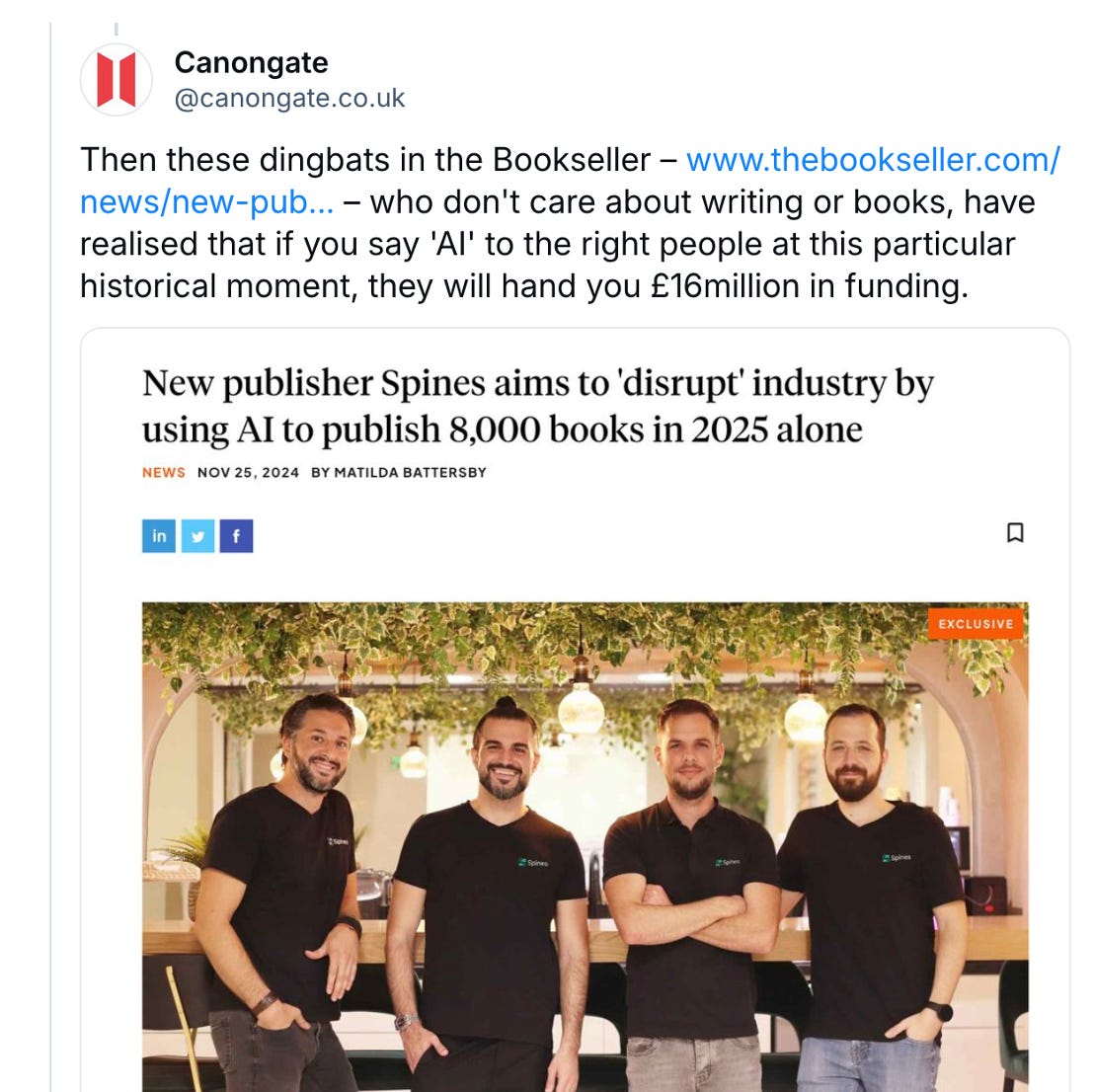
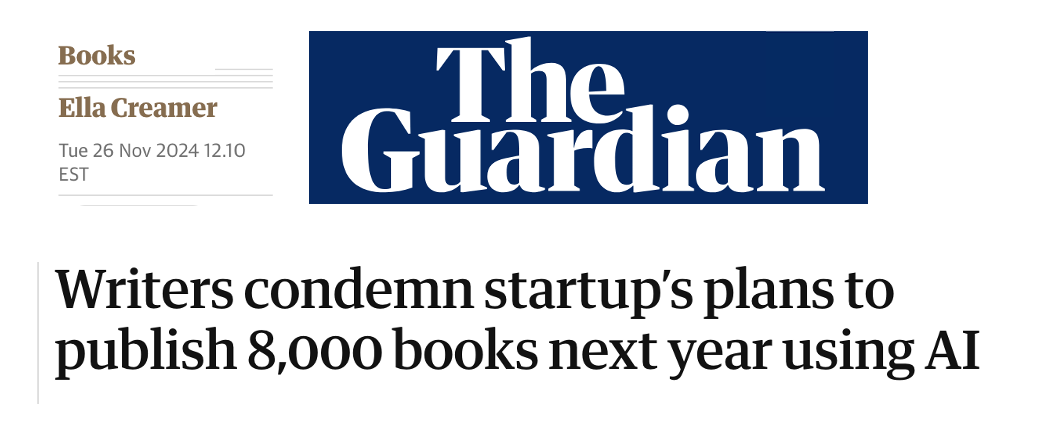
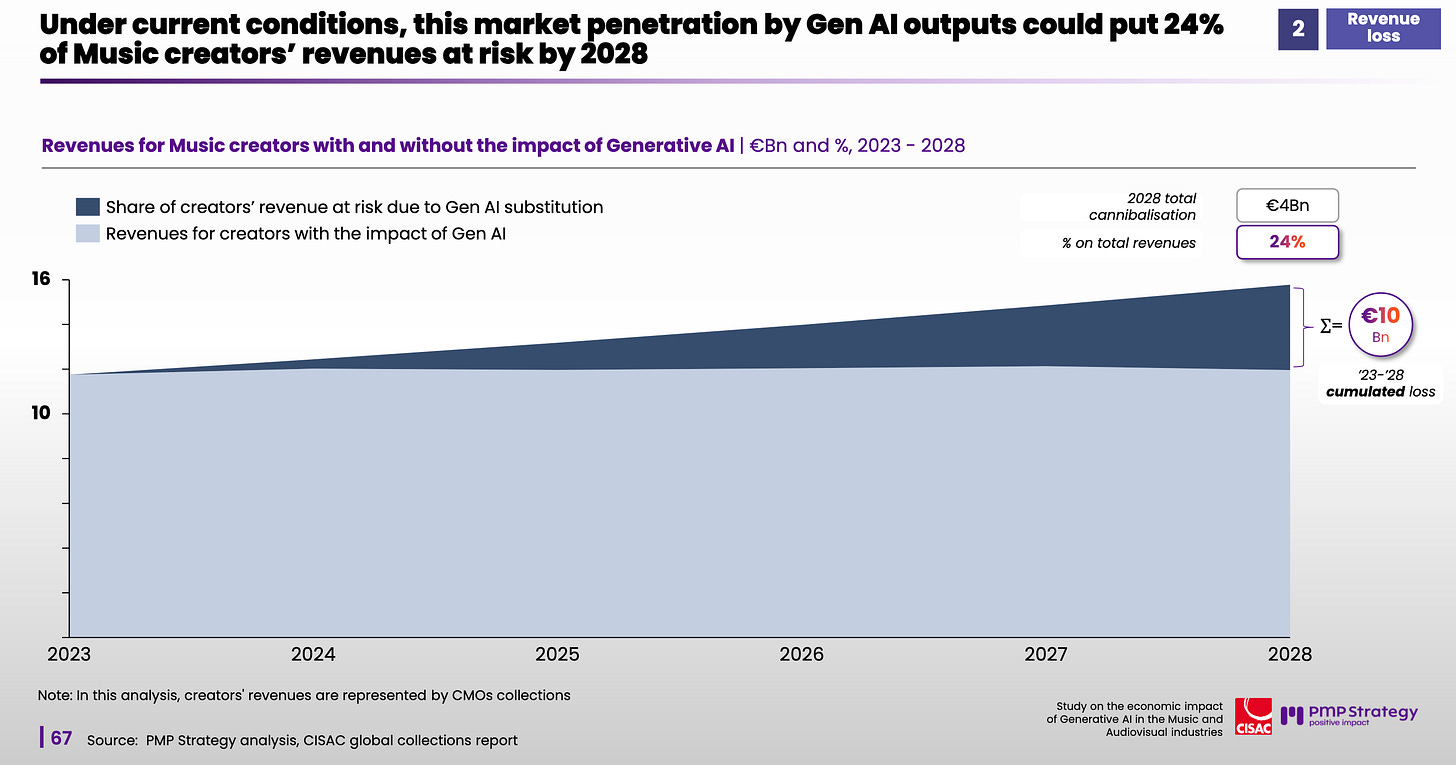
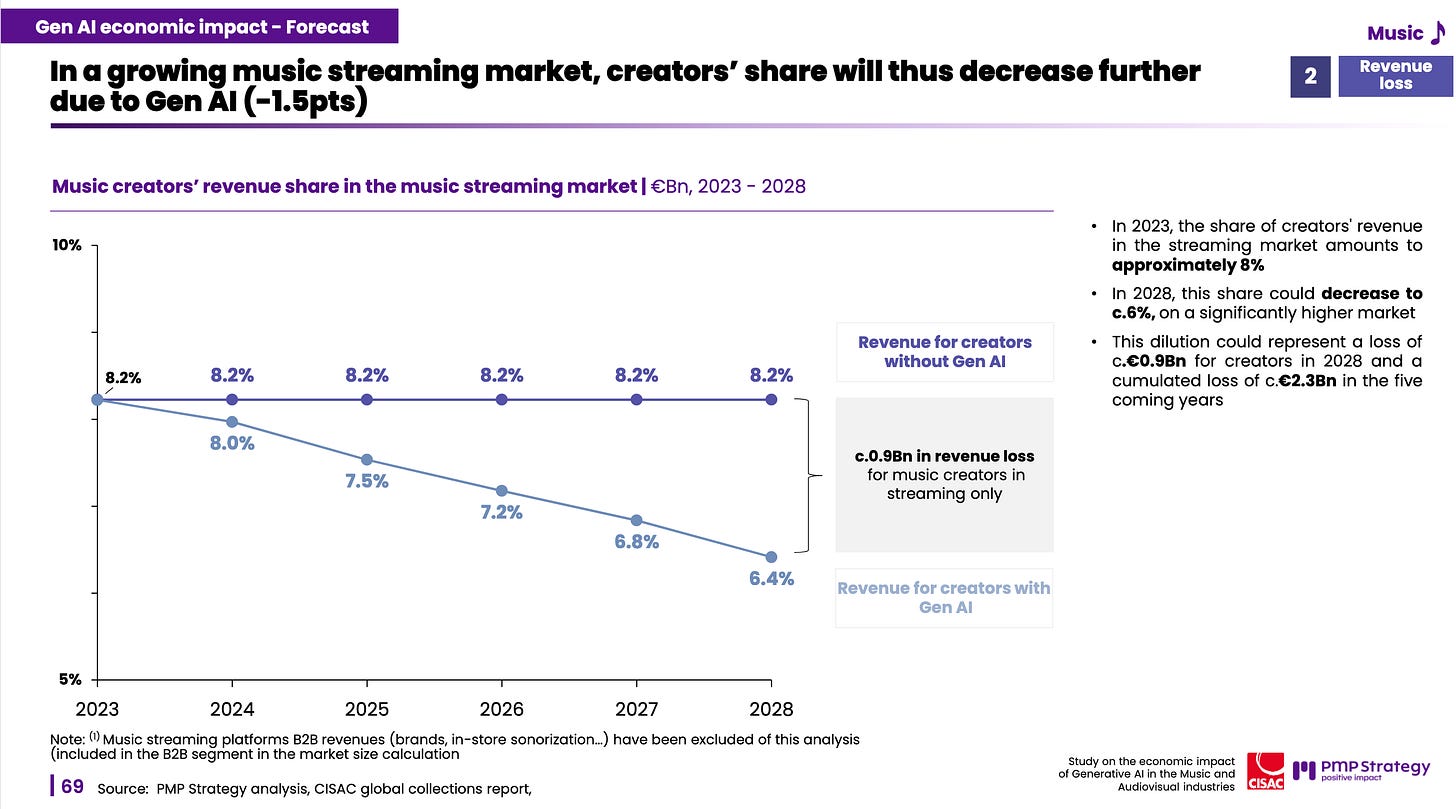
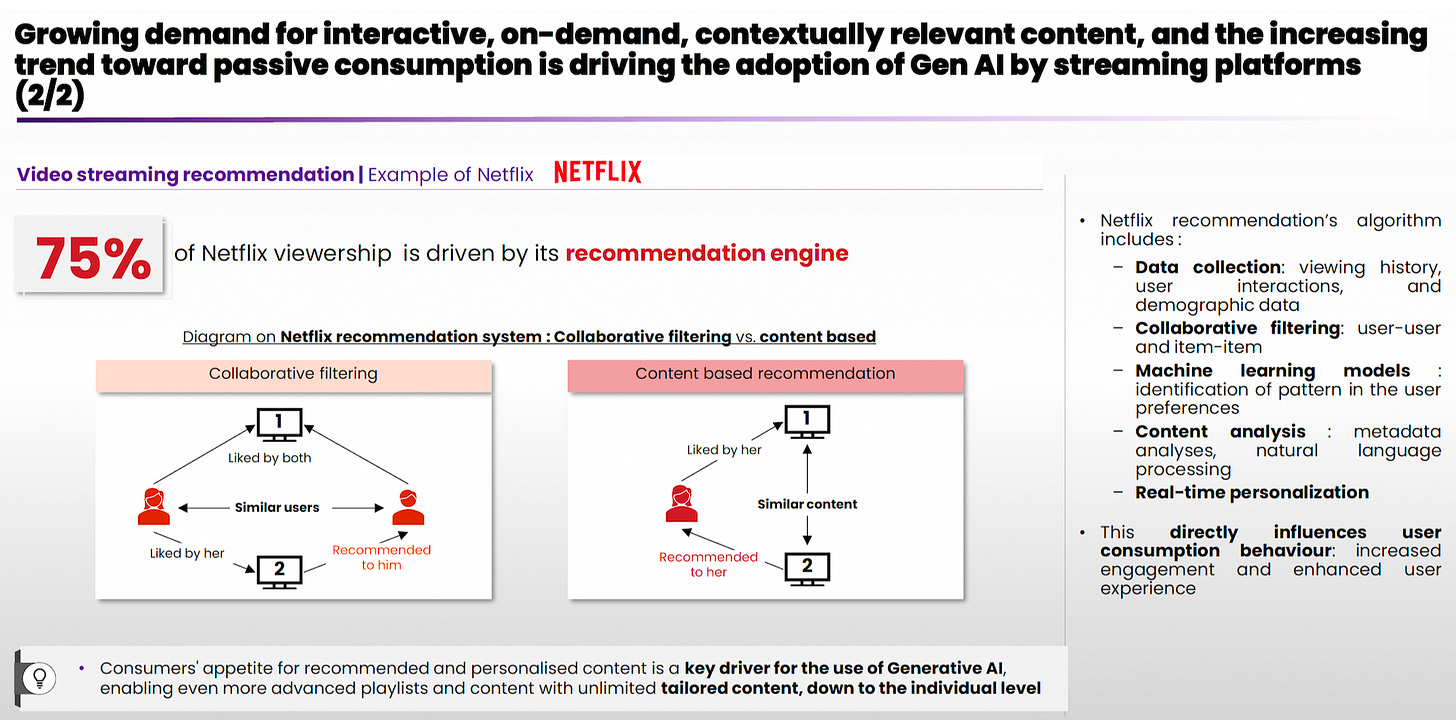
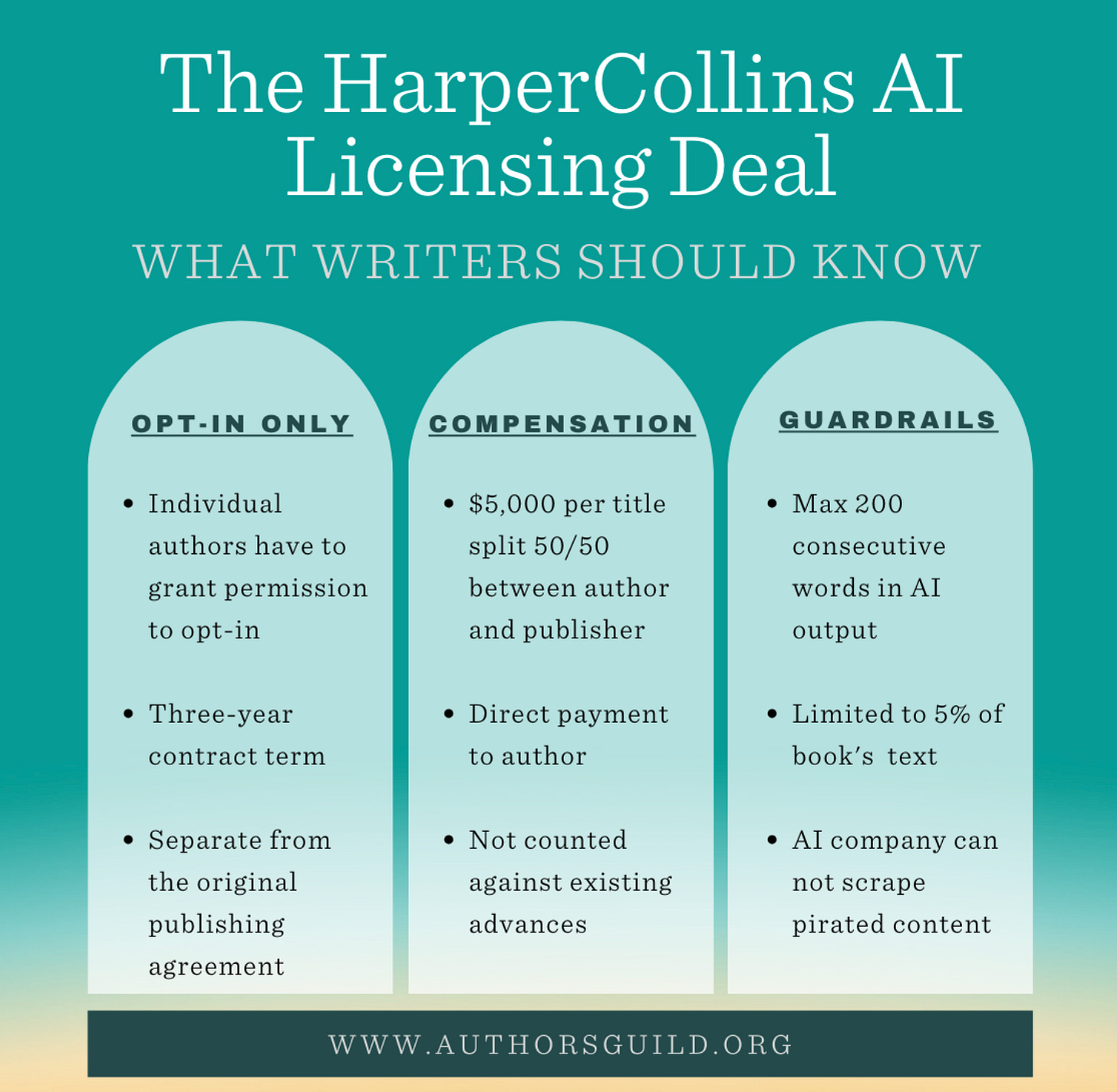
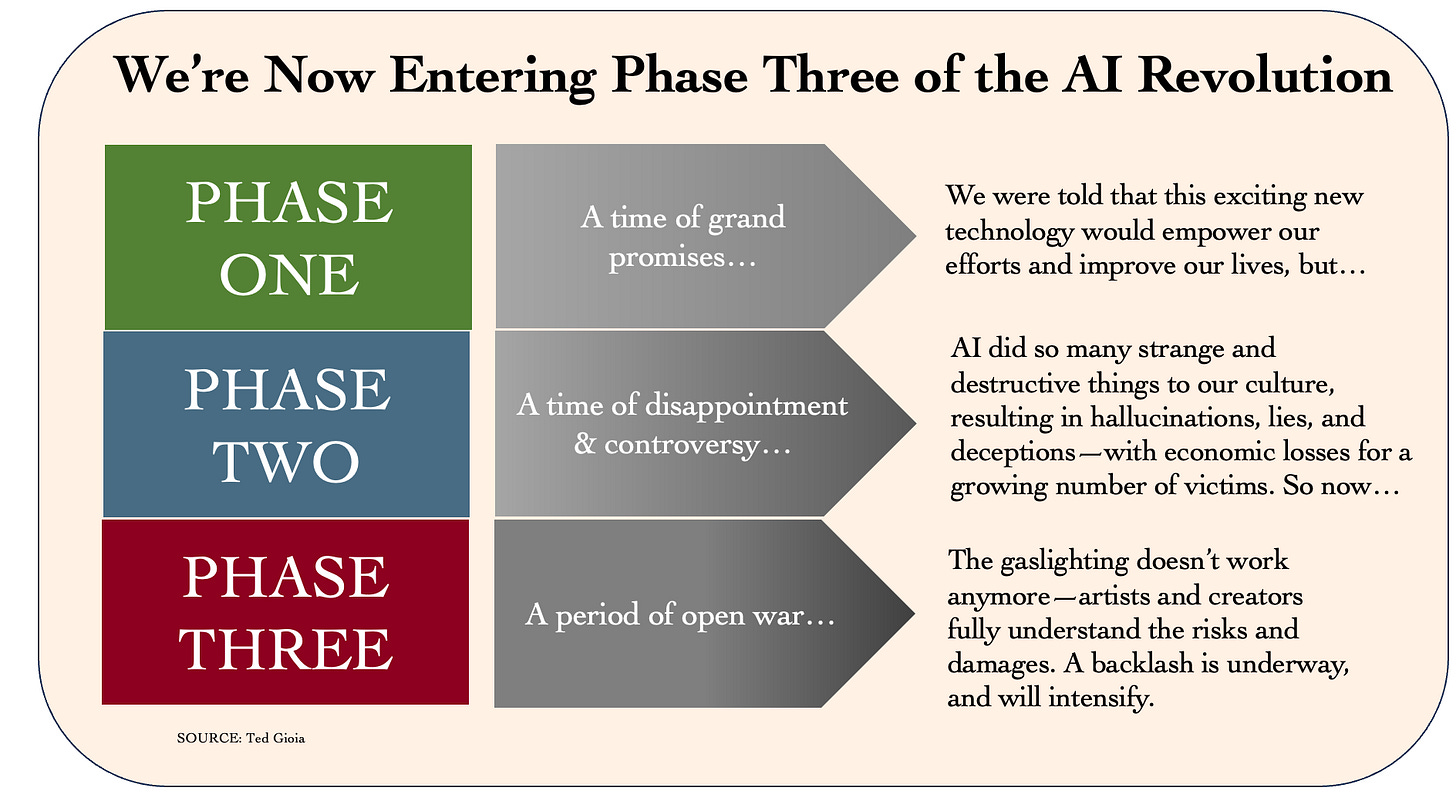





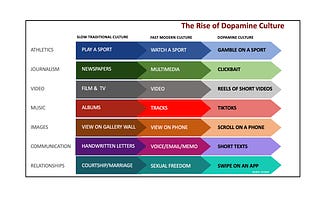
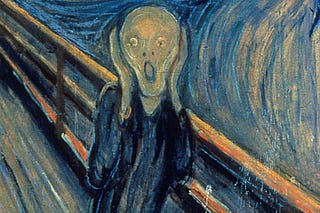

Did anyone else have a visceral negative reaction to the smiling quartet of tech bros in the photo. These aholes will destroy anything for money.
I am teaching a little course on Orwell's journalism and just this week came across some interesting comments from him that seem to foreshadow AI publishing.
"It is just thinkable that books may someday be written by machinery, and it is quite easy to imagine poems being produced partly by fortuitous means--by some device similar to the kaleidoscope, for instance." (From a review of Herbert Read. Orwell is not claiming that this development would be desirable.)
"Political writing in our time consists almost entirely of prefabricated phrases bolted together like the pieces of a child's Meccano set. It is the unavoidable result of self-censorship. To write in plain, vigorous language one has to think fearlessly, and if one thinks fearlessly one cannot be politically orthodox.... [T]he history of totalitarian societies, or of groups of people who have adopted the totalitarian outlook, suggests that loss of liberty is inimical to all forms of literature.... Probably novels and stories will be completely superseded by film and radio productions. Or perhaps some kind of low-grade sensational fiction will survive, produced by a sort of conveyor-belt process that reduces human initiative to the minimum. It would probably not be beyond human ingenuity to write books by machinery.... Imagination--even consciousness, so far as possible--would be eliminated from the process of writing." (These are widely scattered quotes from his essay "The Prevention of Literature.")
And of course this, from his invaluable "Politics and the English Language": "A scrupulous writer, in every sentence that he writes, will ask himself at least four questions, thus: What am I trying to say? What words will express it? What image or idiom will make it clearer? Is this image fresh enough to have an effect? And will probably ask himself two more: Could I put it more shortly? Have I said anything that is avoidably ugly? But you are not obliged to go to all this trouble. You can shirk it by simply throwing your mind open and letting the ready-made phrases come crowding in. They will construct your sentences for you--even think your thoughts for you, to a certain extent--and at need they will perform the important service of partially concealing your meaning even from yourself." I read that last passage rather differently this time than I have read it in the past.
Ted, thanks for helping keep us abreast of this rapidly changing landscape.